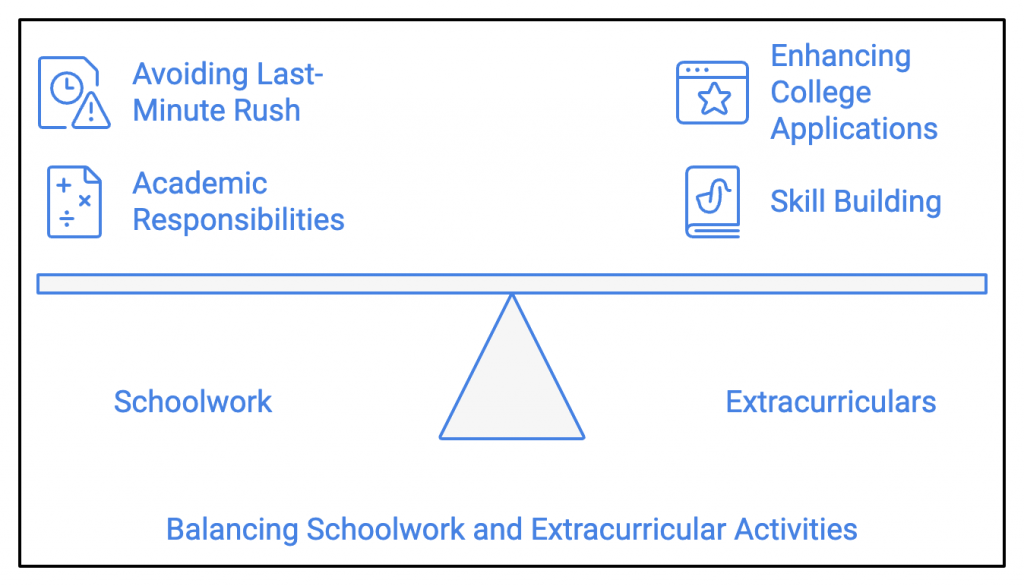How to Get Good Grades in Middle School
Middle school is an exciting time, but it can also feel overwhelming when it comes to keeping up with your grades. Whether you’re trying to get better grades in middle school or just aiming to stay on top of your schoolwork, figuring out the right approach is key. The good news? You don’t have to struggle through it alone. With a few smart strategies, you can easily get good grades without feeling like you’re drowning in homework.
Sometimes it feels like no matter how hard you try, your grades just aren’t where you want them to be. But the secret isn’t about working harder — it’s about working smarter. Maybe you’ve been wondering how to get your grades up fast before the next report card comes out. Or maybe you’re looking for long-term ways to improve grades in middle school so you can walk into every class feeling confident. Whatever your goal is, the key lies in understanding what works for you and sticking to it.
In this guide, we’ll cover everything you need to know, from quick tips to boost your grades in a pinch, to building solid habits that will help you succeed throughout middle school. Whether you’re aiming for small improvements or want to see a big jump in your performance, we’ve got you covered. Ready to dive in and start seeing those grades rise? Let’s go!
How to Improve Your Grades
Alright, so you’re ready to step up and see some changes in your grades. Whether you’re aiming for straight A’s or just want to get your grades up in middle school, the key is finding what works best for you and sticking with it. Here are some practical tips to help you not only survive but thrive in middle school, no matter if you’re in 6th, 7th, or 8th grade.
In short, whether you’re aiming to get straight A’s in middle school or just want to boost your grades, the key is consistency, focus, and using strategies that work best for you. Stick with it, and you’ll start seeing the results you’re aiming for!
Do Middle School Grades Really Matter
A lot of students wonder how much weight their grades carry at this stage. While middle school might seem like a stepping stone to high school, your grades here play an important role in building a strong academic foundation. But let’s break it down: why do grades matter so much at this point?
Setting Up for Success
Grades in middle school are more than just numbers on a report card — they help develop good habits and learning skills that will carry you through high school and beyond. Building strong study habits and understanding how to manage your time will make your transition to high school smoother, where the stakes are higher. So yes, middle school grades are important because they prepare you for the tougher academic challenges ahead.
Understanding Expectations
While middle school grades may not directly affect college admissions, they definitely set the tone for your future academic performance. Teachers, parents, and even potential high school programs will look at how well you’re doing now to gauge your readiness for more advanced classes. This is why it’s important to know that grades do matter in middle school — they can influence things like placement in advanced courses or honors programs.
What Is a Passing Grade in Middle School
Generally, a passing grade varies depending on your school, but it usually falls around a D or C (depending on the grading system). However, simply passing isn’t always enough. Striving for higher grades not only boosts your GPA but also gives you more options later on.
Building Confidence
Earning good grades in middle school not only prepares you academically but also builds self-confidence. When you understand that middle school grades are important, it encourages you to push yourself. Achieving strong grades now shows that you’re capable of handling challenges, which can lead to more success down the road.
In short, your grades in middle school do matter more than you might think. They set the foundation for high school, help build important skills, and show both you and your teachers what you’re capable of achieving.
Understanding the School System
Navigating the middle school years can be a bit tricky, especially if you’re not exactly sure what grades are middle school. Typically, middle school covers grades 6 through 8, but this can vary depending on your school district. These years are crucial because they serve as a bridge between elementary and high school, where the academic expectations and workload gradually increase.
Understanding Grade Levels
Each grade in middle school comes with new challenges and responsibilities. In 6th grade, you’re probably adjusting to more subjects and teachers, while by 8th grade, you’re preparing for high school. Knowing what’s expected of you at each level can help you stay ahead of the game. Understanding grade levels means recognizing that each year builds on the last, and mastering skills early will make later subjects easier to tackle.
Navigating Curriculum
The middle school curriculum is designed to help you develop both academically and personally. From math and science to history and language arts, you’ll cover a wide range of subjects that prepare you for the more specialized courses you’ll encounter in high school. To navigate the school curriculum effectively, it’s important to understand how each subject connects and contributes to your overall learning. Don’t be afraid to ask questions about how certain topics will help you in the future — it can make studying more meaningful.
Tips and Tricks for Students
Middle school can be overwhelming at times, but with the right approach, you can achieve success both in and out of the classroom. Whether you’re juggling schoolwork, extracurricular activities, or just trying to keep your head above water, these tips will help you thrive.
1. Tips for Academic Success
The first step to academic success is staying organized. Keep track of assignments, quizzes, and projects in a planner or use a digital calendar to remind yourself of important deadlines. Time management is key when it comes to keeping up with multiple subjects. Break down big tasks into smaller steps so you don’t get overwhelmed, and always start early — cramming the night before a test is never a good idea!
2. Balancing Schoolwork and Extracurricular Activities
It’s important to find a balance between school and activities like sports, clubs, or hobbies. Balancing schoolwork and extracurricular activities is key to maintaining both your academic success and personal growth. Extracurriculars are great for building skills and even enhancing college applications, but don’t let them overshadow your academic responsibilities. Schedule specific times for both schoolwork and activities, so you’re not stuck rushing through assignments at the last minute.

3. Organizing Your Study Space
A clean, distraction-free study space can do wonders for your focus. Organizing your study space with all the materials you need — notebooks, pens, highlighters, and maybe even some snacks — helps you stay in the zone and make the most of your study sessions. A well-organized space is a big part of staying on top of your work and avoiding unnecessary stress.
4. Preparing for Tests Effectively
When it comes to preparing for tests effectively, it’s not just about memorizing facts. Try different study techniques like flashcards, quizzes, or even explaining the material to a friend or family member. This helps reinforce what you’ve learned. Also, start reviewing early — don’t wait until the night before to dive into everything. This way, you’ll be less stressed and more prepared on test day.
5. Developing a Study Routine
Having a consistent routine can make a big difference in your grades. Developing a study routine by setting aside a specific time each day for homework and studying is crucial. Whether it’s right after school or later in the evening, sticking to a schedule helps you build the habits you need for long-term success. Consistency is key to building a strong foundation.
With these tips, you’ll not only improve your grades but also find a better balance in your school life. It’s all about working smarter, staying organized, and making time for what matters most.
GPA and Academic Success
If you’re serious about improving your grades, understanding your GPA (Grade Point Average) is crucial. But what exactly is it, and why does it matter so much?
Common Questions and Challenges
Middle school isn’t just about grades — it’s also about handling challenges, both academic and personal. Here are some common issues students face and how to deal with them.
Overcoming Academic Challenges
At some point, everyone struggles with schoolwork. Whether it’s a difficult subject or just feeling overwhelmed, overcoming academic challenges is part of the journey. The key is not to give up. Break down big tasks into smaller, manageable pieces, and tackle them one at a time. If you’re stuck, don’t hesitate to ask for help from teachers, friends, or even online resources.
Dealing with Stress and Anxiety
Middle school can sometimes feel like a lot to handle, especially when it comes to juggling multiple subjects, tests, and activities. Dealing with stress and anxiety is an important part of staying healthy and focused. Make sure you’re taking breaks, getting enough sleep, and staying active. Exercise, even if it’s just a walk outside, can help clear your mind. If stress becomes overwhelming, talk to a trusted adult or school counselor.
Finding Support Systems in School
One of the best ways to manage the ups and downs of middle school is by finding support systems in school. This could be teachers who you trust, friends who help you stay focused, or even clubs or activities where you can relax and connect with others. Having a solid support system will help you stay on track, both academically and emotionally.
By understanding your GPA, using smart strategies to raise it, and dealing with the everyday challenges of middle school, you’ll set yourself up for long-term success. It’s all about balance, persistence, and using the resources around you!
Conclusion
Getting better grades in middle school might seem like a big challenge at first, but with the right strategies, it’s totally achievable. By focusing on the tips we’ve covered, you now know how to get better grades in middle school and make the most of your time. Whether you’re looking for ways to get your grades up fast or want to make consistent improvements over time, it’s all about working smarter, staying organized, and maintaining a positive attitude.
To quickly recap, we discussed various methods to improve grades in middle school, like setting small goals, staying organized, and asking for help when needed. The key to getting good grades is not just about cramming the night before a test — it’s about building good habits that will last through middle school and beyond. Remember to set your own personal academic goals and keep pushing yourself towards improvement.
With dedication and these strategies, you’ll see your grades go up in no time. The most important thing is to stay consistent, be patient with yourself, and celebrate your progress along the way.
Additional Resources
If you’re looking for more ways to help you succeed, here are some recommended books for students that can provide extra tips and insights:
- “The Middle School Student’s Guide to Academic Success” by Joanne Lewis
- “Study Skills for Middle School Students” by Bryan Coleman
- “The 7 Habits of Highly Effective Teens” by Sean Covey
Also, don’t forget to check out online study resources like:
- Khan Academy (great for mastering tough subjects)
- Quizlet (perfect for flashcards and test prep)
- SparkNotes (helpful summaries and study guides)
These resources will give you extra support to achieve your academic goals and make middle school a successful experience!



